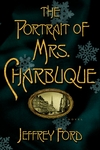Alexander Irvine
Interviewed by Gavin J. Grant
 |
|
Alexander (Alex) C. Irvine's debut novel, A Scattering of Jades, has just hit the bookstore shelves. Set in the USA in the 1840s, the multiple plots in Scattering... include an Aztec mummy discovered in Mammoth Caves in Kentucky, Tammany Hall machinations, ancient gods being reanimated, and one man's search for his daughter whom he had thought dead. By the end, all the disparate stories come together into one big page-turning adventure. In the past year or so, Irvine has published an impressive number of short stories in The Magazine of Fantasy & Science Fiction, Alfred Hitchcock's Mystery Magazine, Strange Horizons, and the anthology Starlight 3. This summer he will have also have two short story chapbooks published. He is nominated for the John W. Campbell Best New Writer Award, and has just started a new magazine, The Journal of Pulse-Pounding Narratives. He lives with his wife, Beth, and their twins, Ian and Emma, in Portland, ME. |
BookSense.com: In A Scattering of Jades, a lot depends on the action within Mammoth Caves in Kentucky. Have you been to the caves or have you ever lived in Kentucky? Why did you choose to write about them -- and was it hard to get across the feeling of being in the caves?
I've been to Mammoth Cave five times, and taken every tour that the public can take, some of them several times. It is an utterly amazing place. I was immediately provoked to write about it, and the story of Stephen Bishop also cries out for telling. A prominent caver named Roger Brucker is currently working on a biography of Bishop, who came to the cave as an illiterate 17-year-old and within 10 years became one of the world's most celebrated cave explorers. He had dreams of emigrating to Liberia, and was manumitted in the 1850s, but died before he could make the voyage.
The cave isn't scary at all. It is spectacular -- in Bishop's words, "grand, gloomy, and peculiar." I imagine it must have been scary for the first explorers, but now it's...pick your superlative adjective: Monumental. Staggering. Astonishing. All of those things, and simply beautiful.
I'm not sure how good a job I did conveying the experience of being in the cave. So much of what you experience below ground has no real analogue in daylight existence. The darkness actually has weight. The air has a smell. Sound carries differently. I sweated over the parts of the book that narrate sensory experience in the cave, and I hope they come across well. The reviewer for the National Speleological Society newsletter seemed to think the cave bits were pretty good, so I guess I was on the right track.
Not everyone would sit down to write a novel and bring together Tammany Hall and ancient Aztec gods...how did this novel come together?
In addition to the trip to the cave, I was reading a biography of P.T. Barnum, and I think the two things started simmering in my head. Also, I was reading a bit about Aaron Burr's conspiracy to invade Mexico and set himself up as emperor of the North American continent west of the Appalachians. Burr had dealings with Tammany Hall, and the collection of Barnum's original American Museum had been started by the Tammany Society, and things went from there. I looked up the origin of the name Tammany and found that the Society was named for the Lenni Lenape chief Tamanend, and then I did some reading about the Lenape and found that they have preserved a narrative of a war back in the shadows of time against a people called the Snake. Then I read that Tamanend had supposedly been in contact with the Aztecs at some point (he was apparently several hundred years old when he and William Penn signed their treaty under the Shackamaxon Elm), and that's where the book hit critical mass. Back to Mammoth Cave, I started reading up on the mummies that early explorers found, and presto. I wanted to write a big book with lots going on that didn't actually contravene known history but took place in historical interstices, and I figured the best way to do that was to read a lot and let connections jump out at me. Man, did they jump.
 |
|
|
 |
 |
 |
 |
 |
 |
 |
 |
 |
 |
 |
 |
Tim Powers once said that there came a point during his reading for his novel Last Call when he felt that he wasn't actually inventing anything, that in fact he was discovering it. I had a couple of moments like that in the research for Jades. A kind of spooky example: one morning I was driving around with my wife Beth in Framingham, Massachusetts, saying to her that I would give anything for a Nahuatl-English dictionary. (Nahuatl was the primary language of the Aztecs.) We both laughed at the absurdity of this idea, and then that afternoon we walked into the Borders in Framingham and there on the remainder table for one dollar was a Nahuatl-English dictionary. Moments like those make you wonder who's pulling your strings.
Another one: In the book I have P.T. Barnum buy a mummy from Mammoth Cave to display in his American Museum. I did this because it was fun and a good way to get the mummy to New York, where I had all kinds of things planned for it. Then, just a couple of weeks ago, the aforementioned NSS reviewer let me know that Barnum really did exhibit a mummy from Mammoth Cave. I had never known that. So I got off easy there, wrote something that was pure story, and found out that it bears a close resemblance to history.
Are you a spelunker? Or did writing this novel turn you into one?
Am not -- but would like to be. I've been on a number of commercial cave tours, and the "wild cave" tour at Mammoth, which is six hours of mud and tight spaces: A great experience. Plus I've been in some of the small caves that you can find in Colorado, and so forth. Writing A Scattering of Jades sharpened my desire to become a caver, but I haven't done it yet. My dream is to get into Lechuguilla, in New Mexico. I'd carry water for the rest of a survey team if they'd let me in there.
Aside: you'd have to work pretty hard to find anyone who spends a lot of time in caves and wants to be called a spelunker. "Caver" is the strongly preferred term. I was just signing at the National Speleological Society Convention up in Camden, Maine, and I saw a bumper sticker that read CAVERS RESCUE SPELUNKERS. Signing at the convention was great because I came away with half a dozen invitations to go caving.
Are there any other places that grabbed you in the same way as Mammoth Caves and made you want to write about them?
Quite a few. An unlikely number of them have something to do with caves, actually. St. Louis is built over an extensive cave system, much of which was used as brewery storage before being sealed off around the turn of the century. Apparently much of the system still exists, and is even accessible if you know where to look. There's a book waiting to happen there.
Other places that have really captivated me are Mesa Verde in Colorado, Seattle (another city with tunnels beneath it), Oak Island in Nova Scotia; lots of others.
Oak Island is particularly fascinating. Sometime around 1790, a guy on the island noticed the remains of a block and tackle hanging from a tree branch over a squarish depression in the earth. He started digging and got to a layer of caulked logs about ten feet down. After going to get a friend, he kept digging, and they found a couple more layers of caulked logs. Below the last was what looked like a shaft. They knocked off for the day and came back the next morning to find their dig flooded with seawater.
Over the next 200 years, all kinds of people (including a young Franklin Roosevelt) took a whack at getting to the bottom of the shaft. Ultimately it was discovered that whoever dug the shaft also had built an artificial beach to hide a series of tidal traps that flooded the shaft when the seals on top were broken. A number of these traps were dynamited shut, but the shaft still floods. It's been excavated down to around 200 feet, and all kinds of things have been recovered in or around it: a gold coin dating from the 14th century, a bit of parchment with unreadable writing, et cetera.
Recently someone sent a camera down into the depths, and that person swears he saw a dead body in a chamber at the bottom. There have been sonar sounding, all kinds of stuff, but still nobody's been able to figure out what's down there or who put it there. Theories range from pirate treasure -- apparently Mahone Bay, where Oak Island is, bears a resemblance to a map carved into the inside of a chest owned by Captain Kidd -- to Templar treasure taken to the New World by Henry the Navigator, to -- I kid you not -- Bacon's manuscripts of the plays attributed to Shakespeare. Absolutely a gold mine for a novelist, Oak Island. When I was there I knew right away I had to use it in a book, and did. It plays a prominent role in another novel I've written, called One King, One Soldier. One King also involves baseball, Arthur Rimbaud, Jack Spicer, the Holy Grail, and the Ark of the Covenant.
Was Tammany Hall really founded as a supernaturally oriented group?
It really was founded with the idea that the members would honor the qualities they admired in the great Lenni Lenape chief Tamanend, who signed an important treaty with William Penn, and they really did indulge in a lot of hocus-pocus kind of rituals. But I don't think they were into esoteric wisdom. It was sort of an Elks Lodge at the beginning, before it metamorphosed into a ruthless political machine and got Martin Van Buren elected president (after having failed with Aaron Burr).
You've published a number of short stories. How did you find making the jump to writing novels?
Funny you should ask. I wrote a large part of A Scattering of Jades before I'd ever written a publishable short story. I started taking notes for the book in late summer of 1993, and didn't write a salable short story until 1994 (and it didn't sell until 1998, and wasn't published until 2000).
So I was writing the novel and writing short stories at the same time, and I've worked that way ever since. I find that if I start to get lost in a novel, which happens to me fairly often, I can refocus by putting the book down and writing a couple of short stories. The flip side of this phenomenon, which is happening to me right now, is that when my short stories start getting longer and longer, I know it's time to start another novel, so that's what I'm doing.
Your bio states (and a couple of reviewers have picked up on) that you are a descendant of P.T. Barnum's. Does this mean you had to run away from the circus when you were growing up?
I've been surprised at how reviewers latched onto this detail. What I actually told the editor was that I am probably descended from P.T. Barnum -- it would take too long to explain how I know this -- but the "probably" got lost on the way to the catalog copy. Which is fine, I think, and how Phineas himself would have wanted it. The probability is very high, so I don't feel like I'm making an outlandish claim, or having one made for me.
Have you worked at a circus -- or been tempted to?
This question stopped me in my tracks because I suddenly realized that I've never been to a real full-blown circus. Lots of carnivals and animal acts, but never a three-ring circus with a ringmaster and the whole nine yards. So no, I haven't worked at one, but I did think about it. I majored in theater as an undergrad, and I've always been a decent athlete, so I thought seriously about going to the clown college that Ringling Brothers runs in Florida. (I think it's Ringling Brothers.) If I'd followed through on that, I might well have ended up working in the circus.
If you did join the circus, what would you do?
Well, if not a clown, let's see. I can juggle a little bit, but not well enough to hold an audience, I don't think, and I'm not cut out for animal training because I'd feed them too much and when it came to showtime the tigers wouldn't want to get off the couch. I'd get a kick out of being the Human Cannonball, I think.
What are you reading?
I just read a great book about contemporary pool hustlers called Playing off the Rail. And I've been reading books on Las Vegas. Fiction-wise, I've been nibbling at Hasek's The Good Soldier Svejk and (for the millionth time, what a tremendous book) Don Quixote. Oh, and I recently finished China Mieville's Perdido Street Station, which deserves all of its accolades, and I'm reading one of the great black comedies about Hollywood, a novel by Bruce Wagner called Force Majeure. And Anna Kavan's Ice. My attention span is so fragmented by sleep deprivation that I can't focus on any one book for too long, so I have one or two in every room of the house that I can just pick up.
If you worked in a bookshop, what would be on your Staff Picks shelf?
Jeff Ford's The Portrait of Mrs. Charbuque, Ted Chiang's new collection Stories of Your Life and Others, China Mieville's The Scar, Gould's Book of Fish by Richard Flanagan.
That's the brand-new stuff. Other books that are front and center in my mind right now are Kafka's Letters to His Father, The Adventures of Kavalier & Clay, anything by Karen Joy Fowler, Sean Stewart's Mockingbird, Midnight's Children by Rushdie, five or six of Philip K. Dick's novels...there are others, but I'm not sure how big my shelf is.
